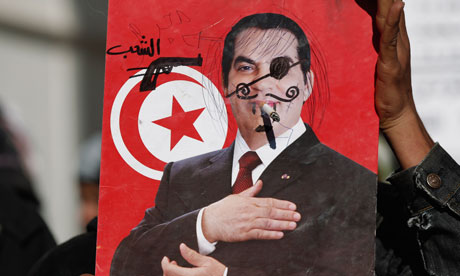Despite an upcoming election, many Tunisians realise the transition to democracy will be a long, complicated process
By Samia Fitouri

A protester displays a defaced portrait of Tunisia's ousted president Zine El Abidine Ben Ali in Tunis. Photograph: Christopher Furlong/Getty Images
It is the most humiliating feeling when you grow up in an atmosphere ruled by paranoia. Imagine living in a society where mobile phones are tapped, where you are watched wherever you go and where you can be arrested if you are ever found praying in a mosque at an early hour.
The omnipresence of president Zine El Abidine Ben Ali's pictures used to haunt us and made us feel that he would remain in power for ever. We still remember how frightening his facial features were – his thick eyebrows looked scary and his overbearing gait made us feel weak and submissive. This is how we used to feel each time he appeared on Tunisian TV screens.
The long years of repression were marked by a depressing exclusion of young graduates from the economic sphere: nepotism won the day. Young graduates found themselves with little or no hope to get a job unless they knew a relative or a member of the "royal family".
Exclusion of young people from the political sphere was even worse. The former regime excelled at hypnotising us with football and music shows to divert our attention from claiming our civic rights.
Considering the discrepancy between theory and reality, it is ironic how they taught civic education in every high school and middle school and made every first-year college student study a subject entitled "human rights". We used to sneer in class every time our teacher spoke of the rights guaranteed by the Tunisian constitution. We complained but we had to be careful not to be heard by someone who would rat on us, so we spoke about politics only in codes.
A golden opportunity came last December when Mohamed Bouazizi's self-immolation triggered a public outrage and made all the Tunisian youth identify with his feelings of frustration and desperation. Tunisian youths were the engine behind the change that swept the country – they are the backbone upon which the Tunisian demographic pyramid rests. This is what our corrupted ex-president had failed to understand.
Young people of all ages have played an increasingly significant role through uploading videos on YouTube and documenting events on Facebook, where millions of Tunisians could follow the updates regularly. News of demonstrations around the country – disseminated online – persuaded others that it was high time to take to the streets.
We still remember how we used to click with a trembling hand on the "share" or "like" button on Facebook after watching a "scandal" video. We also laugh now when we remember how our parents threatened to confiscate our computers if ever they discovered that we were watching or downloading a video showing the political upheaval.
Tunisia is now preparing to elect a constituent assembly that will be tasked with reforming the constitution. As a matter of fact, political parties and civil society associations are little known by Tunisian youths today – which makes the task all the more challenging.
However, we are deeply aware of our citizenship and thoroughly excited by the prospect of voting and participating in the first free election to be held in our lifetime. We are still sceptical, though, about the means to assure a democratic transition in our country.
The most frequent questions that Tunisians ask today are: "what's coming next?" and "has the revolution won?" We are aware that we are still halfway between uprising and revolution, and what is coming next will definitely determine the answer.
On the other hand, fear of the domino effect hovers over the governments of the Arab region. No Arab leader can sleep peacefully these days. Our dream has been always building a strong Arab Union. We may be able to make it true in the near future.
Whatever the final outcome, what happened in Tunisia will remain one of the most inspiring events – ever – in the Arab world, and for the Tunisian youth, toppling Ben Ali's corrupt regime is a second independence.
-This commentary was published in The Guardian 0n 16/08/2011- Samia Fitouri is a Tunisian student
- Hend Hassassi, Amel Bouarrouj and Cyrine Mami also contributed to this article
No comments:
Post a Comment